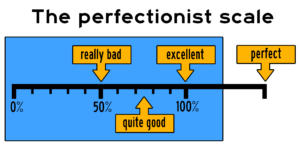“Am I a perfectionist? Nah, I only focus on what really matters. Oh, no! there are two spaces after the question mark! And the ‘t’ after the exclamation mark is not capitalised!!!”
Entrepreneurs deal with a never-ending, multidimensional tradeoff between quality and speed. If they are not extraordinary and delivering unique value, they lose customers to a competitor. On the other hand, they must act fast in order to outpace and overcome their competitors. Their time is limited — they must come up with results good enough for the next fundraising round or a scalable and profitable business before they run out of cash.
This dilemma is highly correlated with the perfectionism of the entrepreneurial team and its management. It comes into play in the daily routines of individuals, which, when accumulated, impact the performance of the company and the mood in it. It is thus crucial to understand perfectionism and its benefits and disadvantages to be able to form an appropriate culture.
“The most valuable thing you can make is a mistake. You can’t learn anything from being perfect.” (Adam Osborne)
Perfectionism can be viewed as a characteristic, an ability, a curse, etc. I personally like to treat it as a tool. As such, before usage, one should read its manual, watch some tutorials or go head-on and gain experience by trial and error! In this post, we will dive into this fascinating phenomenon to better understand its: (1) strengths and how we can utilise them; (2) downsides and their impact. And yes, there are some drawbacks to being a perfectionist; I don’t call it a double-edged sword for nothing!
As I mentioned, this term is not necessarily bad, and an entrepreneur can highly benefit from having such a spirit in their team. When applied at the right times and quantities, it can enhance processes and products quality.


However, when it becomes excessive and exaggerated, it can hinder processes and harm relations within the team. It may be rather hard to detect and identify when this is the root of a problem, and it’s not easy to migrate.
Another important aspect of this subject is whom it is directed at. A person might try to reach their own 110% in tasks, which I call self-perfectionism. It usually primarily affects specific people and their relationships with themselves. Alternatively, in co-perfectionism, someone applies their agenda to colleagues and subordinates. This can have a much more profound impact on the whole team.
Maybe you have felt lately that your sharp eye has dramatically improved something. Maybe you have felt that you were a bit too rigorous and wasted time and energy. Overall, there’s no winning recipe here, and no one can teach you how you should behave regarding this matter; it’s all about awareness and balancing.
I hope you find this article useful and that it will improve your working methods. Feel free to reach out for any comment, query or just to chat!
Visit the Entrepreneurship Centre to find out more.